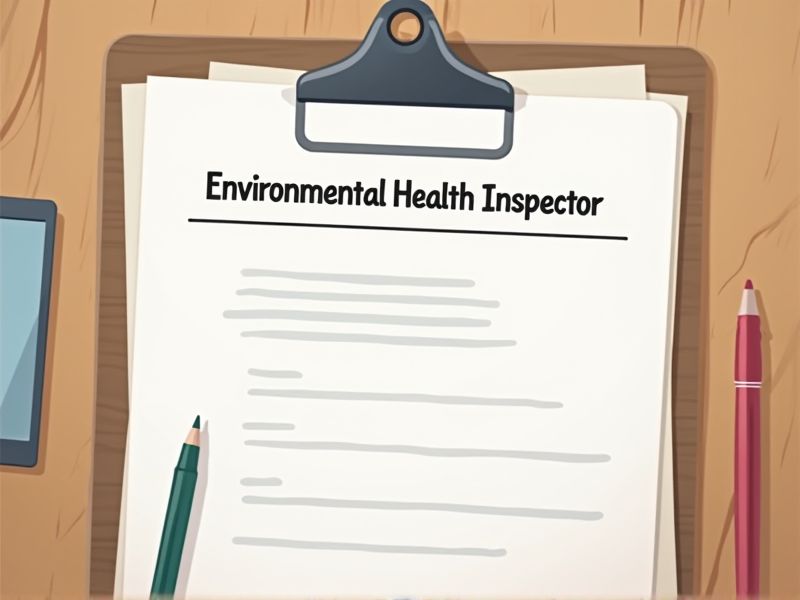
Environmental Health Inspectors play a crucial role in ensuring public safety and protecting ecosystems. The complexity of modern environmental regulations requires these inspectors to be well-versed in identifying health hazards and implementing compliance measures. Certifications provide them with specialized knowledge and skills to analyze environmental data effectively and enforce health standards. Essential certifications for Environmental Health Inspectors include those in hazardous material handling, food safety, and water management.
Registered Environmental Health Specialist/Registered Sanitarian (REHS/RS)
The REHS/RS credential ensures that Environmental Health Inspectors possess comprehensive knowledge of regulations and best practices, leading to improved public health outcomes. Rigorous training and certification validate an inspector's expertise, fostering community trust and compliance with safety standards. Environmental health hazards, like water and air quality issues, require specialized skills to assess and address effectively, which REHS/RS credentials provide. Consistent application of inspection criteria across various environments results from the standardized education received, reducing health risks.
Certified Industrial Hygienist (CIH)
Certified Industrial Hygienists (CIH) possess specialized knowledge in identifying and assessing environmental hazards, which is crucial for effective inspections. Their expertise in evaluating air quality, chemical exposures, and noise levels aids in comprehensive environmental health assessments. The CIH credential indicates a rigorous understanding of regulations and best practices in industrial hygiene, enhancing inspection accuracy. Employing a CIH promotes public safety by ensuring compliance with health standards and mitigating potential risks to the community.
Certified Hazardous Materials Manager (CHMM)
Environmental Health Inspectors face complex risks related to hazardous materials, so a Certified Hazardous Materials Manager (CHMM) enhances their expertise in risk identification and management. The CHMM certification ensures inspectors are adept at complying with regulations, which minimizes legal liabilities. Effective hazardous materials management often reduces incidents of contamination, safeguarding public health and safety. Enhanced training through CHMM equips inspectors with cutting-edge methodologies, contributing to more efficient environmental protection efforts.
Certified Environmental Professional (CEP)
Hiring a Certified Environmental Professional (CEP) ensures a comprehensive understanding of environmental regulations, which directly impacts compliance during inspections. When a CEP is involved, they can identify potential environmental hazards more efficiently, reducing risks to public health. The expertise of a CEP facilitates informed decision-making, leading to more effective environmental management strategies. Engagement with a CEP often results in improved sustainability practices, enhancing community well-being and ecological balance.
Certified Safety Professional (CSP)
A Certified Safety Professional (CSP) designation enhances an Environmental Health Inspector's ability to identify and mitigate potential hazards effectively. With this certification, inspectors can apply advanced risk assessment methods, crucial for safeguarding public health. Employers often seek CSP credentials to ensure compliance with safety regulations and industry standards. The CSP certification reflects a commitment to ongoing professional development, vital for staying updated on evolving environmental health challenges.
OSHA HAZWOPER Certification
OSHA HAZWOPER Certification ensures that Environmental Health Inspectors understand and adhere to safety protocols when dealing with hazardous substances. This certification equips inspectors with critical training to handle and evaluate potentially dangerous environmental conditions effectively. By obtaining HAZWOPER certification, inspectors are better prepared to protect public health while minimizing risks during inspections. Compliance with certification standards helps organizations avoid legal liabilities associated with improper hazardous waste operations.
Certified Environmental Auditor (CEA)
Certified Environmental Auditors (CEA) possess specialized expertise that enhances the effectiveness of Environmental Health Inspectors by ensuring thorough assessments of environmental compliances and standards. Their training in identifying and evaluating environmental risks allows inspectors to rely on accurate data and insights for decision-making. CEAs improve regulatory adherence and minimize the risk of non-compliance by providing comprehensive audits that identify potential environmental hazards. Implementing the knowledge from CEAs helps inspectors create actionable plans to rectify identified issues, ultimately protecting public health and maintaining ecological integrity.
Certified Environmental Manager (CEM)
A Certified Environmental Manager (CEM) brings specialized expertise essential for identifying and mitigating environmental hazards accurately, thereby enhancing the effectiveness of an Environmental Health Inspector. The CEM's training in environmental regulations and sustainability practices ensures compliance with legal standards and reduces the risk of fines or legal action. Their skills in risk assessment and management enable more efficient identification of potential health risks in the environment, protecting public health. CEM credentials often lead to improved stakeholder trust, as they demonstrate a commitment to environmental stewardship and professional excellence.
Certified Water Quality Professional (CWQP)
Certified Water Quality Professionals (CWQP) bring specialized knowledge in assessing and managing water pollutants, which is crucial for maintaining public health standards. Their expertise ensures accurate testing and compliance with regulatory requirements, reducing risks of waterborne diseases. They provide scientific insights that help in the development of effective water management and treatment strategies. Employing a CWQP in environmental health inspection enhances accountability and precision in monitoring water quality.
Certified Air Quality Professional (CAQP)
Certified Air Quality Professionals possess specialized knowledge that helps Environmental Health Inspectors accurately assess pollution levels, ensuring community safety. Their certification provides credibility, which is essential for garnering public trust and compliance with regulations. With expertise in the latest air quality monitoring technologies, they enable more precise data collection and analysis. As regulatory standards evolve, CAQPs offer insights that keep inspection practices aligned with current environmental laws.
Summary
When you obtain certifications as an Environmental Health Inspector, you enhance your credibility and expertise in the field. This usually leads to improved job prospects and potentially higher salary opportunities, as employers often prefer certified professionals. Your skills in assessing environmental risks and enforcing safety standards become more recognized, enabling you to make more informed decisions. The certification also facilitates networking opportunities, as it connects you with a community of other certified professionals.
